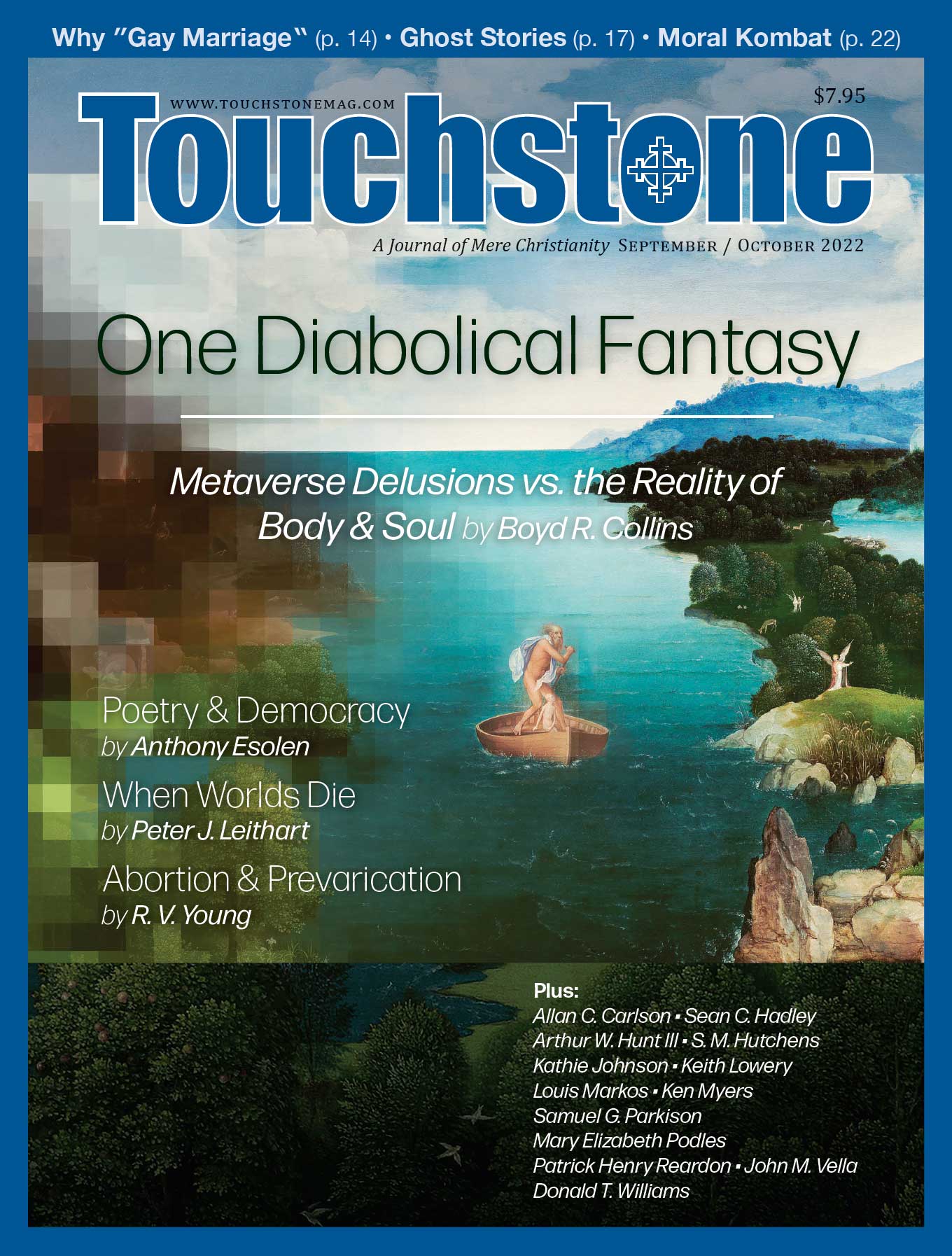One Diabolical Fantasy
Metaverse Delusions vs. the Reality of Body & Soul
According to tech billionaire Marc Andreessen, most people will have a far better life if they abandon what he called “the quote-unquote real world.” In an interview posted on Substack last year, Andreessen, one of Meta’s directors, described himself as a member of what he called the “Reality Privileged,” those who live in “a real-world environment that is rich, even overflowing, with glorious substance, beautiful settings, plentiful stimulation, and many fascinating people to talk to, and to work with, and to date.” As a member of the Reality Privileged, he’s concerned for the Reality Deprived, and he suggested a fix:
[R]eality has had 5,000 years to get good, and is clearly still woefully lacking for most people; I don’t think we should wait another 5,000 years to see if it eventually closes the gap. We should build—and we are building—online worlds that make life and work and love wonderful for everyone, no matter what level of reality deprivation they find themselves in.
Rather than trying to make the real world more liveable for everyone, the Reality Privileged are building a metaverse that will provide each member of the Reality Deprived with his or her own digital paradise.
But what would a human being have to become to feel truly satisfied with the fulfillments available in a virtual world? Aren’t most of us driven by an insatiable hunger after truth, beauty, and goodness, however bleak their contemporary manifestations? Is not the abandonment of that search equivalent to spiritual death? Once we investigate what type of human being the metaverse is designed for, we will be able to understand how these worlds are likely to transform the human soul.
In 2021, Mark Zuckerberg announced that Facebook had begun its transition to a full-immersion virtual reality (VR) platform. To emphasize the pivotal nature of this shift, he changed his company’s corporate name to Meta Platforms, Inc. The “embodied internet” he envisions is an evolution of the current internet that would allow an unlimited number of users to share 3D virtual worlds simultaneously.
Each user will be able to design a personal avatar that will function as his or her primary identity, though multiple avatars will also be supported. As users travel through the metaverse, their personal data will be continually tracked. This means that they will be able to accumulate credit and make payments that will be securely tied to their metaverse identities. Zuckerberg’s vision assumes that we will work, shop, socialize, become educated, and be entertained in digitally fabricated domains. He seems convinced that the metaverse will one day be the primary reality for his platform’s users, who currently number 2.9 billion.
Many tech leaders believe that, for most people, the real world can’t compete with what Jane McGonigal describes in her influential book, Reality Is Broken, as
the carefully designed pleasures, the thrilling challenges, and the powerful social bonding afforded by virtual environments. Reality doesn’t motivate us as effectively. Reality isn’t engineered to maximize our potential. Reality wasn’t designed from the bottom up to make us happy. . . . Reality, compared to games, is broken.
In other words, instead of subsisting in the “broken reality” of the God-created cosmos, these tech lords are convinced that most people will prefer to live in environments designed to guarantee human happiness. Once these become available, the “desert of the real” may end up being inhabited only by the outcasts from electronic heaven.
There are two major ways to reason morally about machine-generated reality. If we regard it as a neutral technology, then its potential for misuse lies primarily in the greed and power-seeking of its owners. For instance, it could be used to indoctrinate its denizens with a political ideology. On the other hand, if the inherent nature of the technology requires a model of the human being that degrades body, mind, or spirit, then it may be seen as an abuse of science analogous to contraception. Note that the term “metaverse” as used here is not a synonym for “virtual reality” but a specific application of that technology as envisioned by tech leaders such as Mark Zuckerberg. As we will see, once we uncover the theology of the person that informs the metaverse, the latter’s lack of neutrality will become obvious.
The Illusion of Human Identity
In his “Theology of the Body” talks, Pope John Paul II described how married couples should honor the full meaning of the conjugal act:
The problem lies in maintaining the adequate relationship between that which is defined as “domination . . . of the forces of nature” and that “self-mastery” which is indispensable for the human person. Contemporary man shows the tendency of transferring the methods proper to the first sphere to those of the second.
The contraceptive model of the person presumes that we are tools of our physiology, that to resist our sexual desires is to falsify our nature, to become inauthentic. In reality, sex is a gift from God that we honor by disciplining our urges and integrating them into relationships of self-giving. Contraceptive culture turns us into slaves to our hormones by redefining sex as an inescapable need rather than an instrumental section of the body’s orchestra to be integrated into the symphonic truth of the person.
A similar captivity operates in the metaverse, but instead of unleashing a single bodily drive from the integrated body-person, the entire body/soul composite becomes the “nature” to be technologically dominated. To achieve this, the embodied internet must directly attack the concept of the authentic self, the core of personal responsibility that integrates our feelings, thoughts, and desires into a coherent personality. It assumes that what we refer to as our “inner self” is merely a complex illusion created by the pattern-seeking behavior of the brain. In the virtual world, the person consists of drives that must be algorithmically engineered to support the delicate equilibrium that constitutes the illusion of human identity.
In other words, just as contraception unleashes sexuality from its inherent ordering toward the good of the family, so the metaverse releases our feelings, thoughts, and desires from their ordering toward the good of the person as constituted by its unity of body and soul. Instead, each user’s personality becomes a self-chosen myth, a fashion statement defined by his or her identity politics. Instead of allowing users to govern their passions, the system inflames them until they rage uncontrolled, and the inner self experiences its emotional slavery as a revelation of its true identity. The inhabitants of the metaverse become a mass of disjointed desires stirred up to ensure maximum user engagement.
Today most users are aware of the addictive nature of social media, but few understand the specific techniques used to induce their dependency. The following are the essential operations: (1) the platform collects massive amounts of user data in order to populate profile attributes that identify each user’s tastes and triggers; (2) machine-learning tools experiment with different combinations of colors, sounds, texts, images, and other stimuli to find out what keeps a particular user clicking; and (3) an AI-based predictive engine analyzes each user’s responses in order to generate content likely to keep him absorbed. The purpose of this infrastructure is to predict and influence user behavior as effectively as possible. The result is that the user becomes a commodified identity to be managed and exploited for commercial purposes.
The metaverse will use similar methods, but since its users are fully immersed in virtual sights, sounds, and sensations of touch and motion, it commands a much more persuasive set of behavioral conditioners. Instead of merely showing provocative party photos or enticing text messages, the embodied internet can place users directly in virtual parties and let attractive avatars deliver suggestive offers. The power of the embodied internet to influence human behavior will likely become as compelling as real-life situations.
Just as unlimited sexual freedom leads to slavery to one’s hormones, metaverse dwellers may not only lose control over their sex drive but become incapable of mastering any desire. Once the user has been profiled, machine-learning tools comb through his attributes seeking pleasure centers that can be stimulated and exploited. Then the system’s behavioral architecture multiplies and intensifies the user’s cravings in order to maximize his adhesion. The less willpower the user has and the more obsessive his appetites become, the better the system is working for its owners.
To picture how the future embodied internet might work, consider an episode from the popular TV anthology series Black Mirror. In a near-future setting, workers earn the credits needed to survive by riding stationary bicycles while being entertained by personalized VR. Once they have earned enough credits, they can use them to enter contests in which they might be able to win their freedom from bicycle riding. The prizes awarded to the winners include selling one’s body to pornographic movie makers and making on-screen suicide threats into a new type of entertainment offering. In the embodied internet, the only taboo is the dignity of the human person.
Deconstructing the Human Person
In his Letter to Families, John Paul II described a new Manichaeism, “in which body and spirit are put in radical opposition; the body does not receive life from the spirit, and the spirit does not give life to the body. Man thus ceases to live as a person and a subject.” The model of the human person that informs the embodied internet assumes that the human body and soul do not form a spiritual whole but that the person can be dissected into an inner self and an outer body without deleting his essential humanity.
Only within the indissoluble unity of body and spirit can we live as persons. Contraception subverts the divine plan for generating human life by treating the body as a biological tool to serve the lust of a detached inner self. Similarly, the metaverse disrupts the divine plan for humans to complete the work of creation by cloaking them in a pseudo-self that thrives on the comforting lies of a simulated world.
The father of virtual reality, Jaron Lanier, believes that VR reveals basic human nature to be pure consciousness independent of the body. In his recent book, Dawn of the New Everything, he wrote, “From inside VR you can experience flying with friends, all of you transformed into glittering angels soaring above an alien planet encrusted with animate gold spires. Consider who is there, exactly, while you float above those golden spires.” He implies that the self around which the virtual world revolves is also an “angel,” namely, our detached consciousness lurking inside its biochemical sheath. In the metaverse, we are supposedly liberated from the “meat,” the flesh that traps us in a socially constructed identity.
The embodied internet disconnects the person from his actual body, replacing it with an avatar that represents his preferred identity. As spiritual writer Jeremy Naydler wrote in his book The Struggle for a Human Future, “a person may come to identify more and more with their avatar, feeling that they can be more truly themselves through their online persona than in real life.” Unfortunately, the user thereby ceases to identify with the body that has been inscribed by God with an unrepeatable individuality. The inhabitants of the metaverse learn to accept a designer fantasy in place of the body that reflects the image of God.
The living human face says “I” to my “I.” An avatar, on the other hand, is a more or less realistic 3D cartoon representing a possible person. According to the article “Meanings of the metaverse: Secondary embodiment” by acclaimed technology writer Nicholas Carr, “it would be an error, a profound ontological error, to think that virtual embodiment is the same as actual embodiment.” Our human soul and body form an indissoluble whole which constitutes our true identity. Our avatar, on the other hand, is a consumer choice usually based on whatever personality types might be trending at the moment.
The metaverse requires that we become simulated versions of ourselves so that we can interact with other simulacrums. In it, our designer identity empties out the humanity that can only be nurtured in a body of flesh and blood. Carr depicts the stark result: “The metaverse will be the only world we know, and we will be alone in it.”
Taming the Algorithmic Animal
The vertical dimension of the person is built on self-mastery through moral competence, often referred to as “virtue,” the source of human freedom. We are spiritual creatures, which means that our desires can be multiplied beyond all rational limits if we let our inner animal run loose in the way that delights our cybernetic masters. If our urges are left unregulated by the spirit, they lose their human meaning and become ends in themselves, as we see in many sexual disorders. If, on the other hand, we lift them into the realm of values and persons, we grow in both self-possession and inner satisfaction.
Online platforms are designed to induce mindless surrender to the impulse of the moment. Users caught in a whirl of incessant emotional stimuli may feel as if they were tingling with life, but they are merely drowning in the great data flow. This flow is a chase after gratifications that must constantly be refreshed to sustain their power to captivate. It corrupts our higher aspirations by keeping us stuck within the pleasure centers of our lower nature.
To grow in the spirit, we must cultivate proper receptivity toward God’s gifts. Gilbert Meilaender says in The Taste for the Other, “To seek in any created thing a complete fulfillment of the longing which moves us is to make of it an object of infinite desire and, because it is only a created thing, a false infinite.” The term “false infinite” sums up the operational goal of the metaverse. It is designed to drive users into a never-ending chase after fleeting satisfactions so that the platform can monetize their behavior.
To escape into the embodied internet is an unmistakable “No” to the gift of creation. This “No” is a plea that we might stay locked in our algorithmic cage, ceaselessly fed with pleasures that match our profile attributes. We can move toward our spiritual potential only when we stop insisting that our favorite gratifications be replayed in an endless loop. Instead, we must learn to throw ourselves into the waves of life with full willingness to accept the unexpected with gratitude. A brighter future lies ahead if we boldly trust that God cares for us, that he knows what we need and has not forgotten us.
Every enjoyment is a shaft of heaven’s glory, but none can wholly satisfy us because we fulfill our purpose only by seeking a happiness that targets the root of all delight. The metaverse guarantees delivery of personalized pleasures so long as we are willing to rest our hearts in the efficacy of AI-driven algorithms. But St. Augustine reveals the flaw in this system when he says in his Confessions, “For Thou hast made us for Thyself and our hearts are restless till they rest in Thee.”
Imago Dei
The deal being offered to the Reality Deprived may be best understood as a spiritual test. The basic dilemma is this: Should we escape the postmodernist disaster zone by fleeing into Meta’s virtual worlds, or should we seek to resurrect humanity’s higher destiny by cultivating values suited to persons made in the image of God? The advertised benefits of the first option include gamified work environments guaranteed to keep us challenged and productive, intense social bonding, and unlimited personalized pleasures. In the non-virtual world, on the other hand, we are likely to be faced with an economic wasteland in the wake of the covid crisis, an ailing planetary ecology torn apart by endless wars, and an accelerating decline in psychological and moral health among the burgeoning ranks of the unemployed.
For the Reality Deprived, the question then becomes, “How much does truth really matter?” One of the most well-known philosophers of consciousness, David Chalmers, declared in a recent interview in The Guardian: “In the long term, virtual worlds may have most of what is good about the nonvirtual world. Given all the ways in which virtual worlds may surpass the nonvirtual world, life in virtual worlds will often be the right life to choose.” Of course, “most of what is good” means simulations of good realities, not the realities themselves. What matters to Chalmers is the happiness quotient of the chooser, not his capacity to choose genuine values.
As with contraception, the fundamental option revolves around the question, “Whom shall I serve?” Does the married couple leave the choice for or against offspring open to God’s influence, or do they decide for themselves? Do the Reality Deprived choose to accept the pain and responsibility inherent to a God-given but fallen world, or do they give up their self-mastery for a life of AI-managed pleasures? In either case, the answer they choose commits them to a specific definition of the human person.
To those for whom lifestyle quality is the deciding factor, the person is a set of attributes to be fashioned into a personal brand that enables a life of ceaseless distraction. But those who seek a true relationship with God must affirm themselves as unique human words never to be repeated, chosen by eternal Love for its own sake. This dignity is a source of self-respect impervious to hardship or contempt. Genuine character can only be founded on an unyielding reverence for truth.
According to Romano Guardini in his book Learning the Virtues That Lead You to God, true selfhood “comes from the will to truth. In every true thought and word and deed, the interior center, the true self, is confirmed, imperceptibly but really.” In this experience, we discover a power within ourselves that does not compel agreement through force but by the light of the Logos, reason bearing witness to truth through unmistakable conviction. In the face of this authority, tyranny can condemn and punish, but its lies will forever fail to convince.
The basic design principle of the metaverse is that the human body and soul are configurable components that can be used to pander to fantasies about the “real me.” Pope Benedict XVI portrayed the consequences of this attitude in his Christmas address to the Roman Curia in 2012: “When the freedom to be creative becomes the freedom to create oneself, then necessarily the Maker himself is denied and ultimately man too is stripped of his dignity as a creature of God, as the image of God at the core of his being.” For the Christian, the flesh is not a prison from which his or her fantasy identity must be liberated. Instead, it enables a love that reveals the infinite value of the person in “that heaven he makes most bright,” which Dante portrayed in the Paradiso.
In a fallen world, our inherent brokenness, our failure to live up to the imago Dei, which never ceases to shine within us, can’t be dodged by redefining it as a technical issue. Despite the mockery of the “quote unquote real world,” it is only in the world that arises out of the creative cognition of God, the objective world of being, that human nature can be redeemed. David Bentley Hart put his finger on VR’s basic weakness in an incisive article titled “Reality Minus,” where he wrote that “in a simulated world, only simulated selves could exist; no one—absolutely no one—ever will or could be at home there.” This insight helps us appreciate the value of our true home—this haggard and vulnerable but resurrectable human body and the spirit-woven world that nourishes it.
In the embodied internet, users are sheltered from the risks and rewards of the only world capable of fulfilling the human soul. According to the Catechism of the Catholic Church, God enables human beings to become “intelligent and free causes in order to complete the work of creation, to perfect its harmony for their own good and that of their neighbors.” To sincerely pledge ourselves to this work, we must lose our taste for the artificially flavored experience that characterizes the metaverse—the cartoonish colors, synthesized sound bites, apocalyptic fantasies, and degraded sensuality that infuses dead souls with a semblance of life. Instead, by regaining our appetite for the healing atmosphere of natural realities, such as unsimulated human smiles, we can reawaken our hearts and learn to live with gratitude within the normal beauties of God’s glorious creation.
Boyd R. Collins worked as a web developer for nearly three decades. Now retired, he writes and lectures about social media addiction and related topics. In 2021, he presented his findings on social media addiction at the International Conference on Artificial Intelligence at the Colegio San Agustin in the Philippines.
subscription options
Order
Print/Online Subscription

Get six issues (one year) of Touchstone PLUS full online access including pdf downloads for only $39.95. That's only $3.34 per month!
Order
Online Only
Subscription

Get a one-year full-access subscription to the Touchstone online archives for only $19.95. That's only $1.66 per month!
bulk subscriptions
Order Touchstone subscriptions in bulk and save $10 per sub! Each subscription includes 6 issues of Touchstone plus full online access to touchstonemag.com—including archives, videos, and pdf downloads of recent issues for only $29.95 each! Great for churches or study groups.
Transactions will be processed on a secure server.
more on culture from the online archives
more from the online archives
calling all readers
Please Donate
"There are magazines worth reading but few worth saving . . . Touchstone is just such a magazine."
—Alice von Hildebrand
"Here we do not concede one square millimeter of territory to falsehood, folly, contemporary sentimentality, or fashion. We speak the truth, and let God be our judge. . . . Touchstone is the one committedly Christian conservative journal."
—Anthony Esolen, Touchstone senior editor













